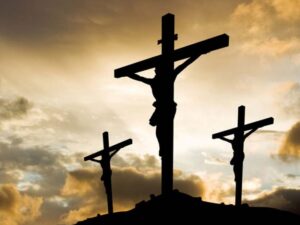
“The pleasure of the LORD shall prosper in His hand.” (Isaiah 53:10)
In parts one and two, we looked at the first three Servant Songs in Isaiah 42, 49, and 50. We also started looking at the fourth Song in Isaiah 52. We continue our study in part three, which carries over through Isaiah 53. Nowhere else in the Scriptures do we see such an enormous description of Jesus’ riches than here. This chapter illustrates it so well that it should be called the “gospel of Isaiah” rather than a prophecy.
Chapter 53 begins with the speaker changing from the Father to the nation of Israel. The people question who would believe Isaiah’s prophecy (and his others) concerning the Messiah Jesus because He was not who they anticipated.
“Who has believed our report? And to whom has the arm of the LORD been revealed?” (v1)
The arm mentioned here in verse one has a unique meaning.
In the story of the Exodus, God rescues the Israelites from Pharaoh and delivers them out of Egypt. But before they left, the Lord tested them by commanding them to sacrifice a lamb and paint its blood on their doorposts. The blood ensured that the angel of death would “pass over” their house. Then, God commanded them to roast the lamb and eat it. Though they do not recognize it, the lamb foreshadows the Servant, the Messiah Jesus.
Traditionally, Jewish people refer to this lamb in their annual Passover celebrations by placing a lamb shankbone on the table to honor its sacrifice. It symbolizes two things: thanksgiving for the Lord’s protection and God’s outstretched arm, called zero’ah in Hebrew.
Zero’ah is the “outstretched arm” of God’s redemption.
The Father’s Zero’ah
Isaiah 53:1 of the fourth Servant Song shows Israel’s concern about who will recognize the Messiah and acknowledge His zero’ah. Unfortunately, very few recognized Him (and continue to), even though He grew up right before their eyes, which we see in verse 2.
John Oswalt of Asbury College wrote in his book, The Book of Isaiah, that the tender shoot mentioned in verse 2 refers to “the normally unwanted shoot that springs up from an exposed root of a tree (pg. 382).” Such an image underlines how the people disregarded Jesus as anyone noteworthy. To them, He was insignificant, unimpressive, and unattractive. The fact that He did not grow up to be a great military leader, rebel, or even some kind of royal deliverer further cemented their belief. Jesus was just an ordinary, everyday man.
If anyone knew who He was, it was only in terms of Him being the son of the local stone mason and not the promised Messiah. He was just a kid in the neighborhood, a nobody from Nazareth.
“Is this not the carpenter’s son? Is not His mother called Mary? And His brothers James, Joses, Simon, and Judas? And His sisters, are they not all with us?” (Matthew 13:55-56)
The apostle John also describes how Israel did not recognize Him, including His disciples, in the early days of His ministry.
“He was in the world, and the world was made through Him, and the world did not know Him. He came to His own, and His own did not receive Him.” (John 1:10-11)
Only those with discerning faith recognized that Jesus is the Servant Isaiah wrote about, the promised Messiah. But those with such faith were very few.

The Easter Servant Song
The rest of the fourth Servant Song in chapter 53, verses 3-12, is a well-known portion of Scripture. Believers often mention them during Easter celebrations. Verses 3-6 are rich with meaning and precisely describe the suffering Servant, Jesus.
“3He is despised and rejected by men, a Man of sorrows and acquainted with grief. And we hid, as it were, our faces from Him. He was despised, and we did not esteem Him. 4Surely He has borne our griefs and carried our sorrows. Yet, we esteemed Him stricken, smitten by God, and afflicted. 5But He was wounded for our transgressions. He was bruised for our iniquities. The chastisement for our peace was upon Him. And by His stripes, we are healed.”
Verse 3 says Jesus was “acquainted with grief.” A better translation is “suffering.” The New Testament gospels amply describe the execution process in which Jesus endured acute physical pain and disfiguring torture on His way to the cross. In fact, His disfigurement at the hands of the Romans was so extreme, according to the Bible, that people turned away from Him in horror.
Also in verse 3 is the phrase “despised and rejected.” Here, the word despised is the same Hebrew word (“baza”) used to describe the evil King Antiochus Epiphanes in Daniel 11:21. It can also translate as “contemptible, scorned, or detestable” (The Strongest NIV Exhaustive Concordance, 1999).
As far as the people were concerned, the Servant Jesus was repulsive. Therefore, they concluded in verse 4 that He must have been undergoing divine punishment (“smitten by God”). They also assumed He was “stricken” (Hebrew, “naga,” “to strike violently”), often with disease because of sin. The Bible used the same word when God struck both Miriam (Numbers 12:9-10) and King Uzziah (2 Kings 15:5) with leprosy for their sins.
The Servant Wounded to Death
As the people watch Jesus’ procession to the cross and slowly comprehend His sacrifice, Israel quickly becomes repentant in verse 5.
“But He was wounded for our transgressions. He was bruised for our iniquities. The chastisement for our peace was upon Him. And by His stripes, we are healed.”
Some translations say He was “pierced” rather than “wounded.” “Pierced” in Hebrew (“chalal”) in this case translates to “wounded to death,” which implies He suffered a violent and painful death. Because of the excessive brutality Jesus endured, Israel’s eyes began to open, and they became increasingly aware that He took the punishment they deserved (“chastisement”).
Though Jesus was stricken, despised, and pierced, we can be confident that “by His stripes, we are healed.” However, it is important to note that the wounds He endured do not instantly cure all our sicknesses. Instead, it means His death provides a way of spiritual deliverance and healing for all who put their trust in Him.
Because of His shed blood, we are set free from the consequences of sin.
A Fraudulent Secret Trial
The fourth and final Song finishes in verses 7-12, where the speaker reverts to the Father again. He describes His Servant’s quiet submission, sham trial, and ultimate exaltation.
“Yet He opened not His mouth. He was led as a lamb to the slaughter.” (v7)
Out of sheer, unfailing loyalty to the Father, Jesus willingly accepts His suffering. Such submission leads the religious and Roman leaders to equate His lack of resistance with guiltiness. The truth is He fully understood His mission. At no time was He required to bear our sins. Rather, He chose to do it to fulfill the Father’s plan.
Verse 8 prophesies the kind of trial the Servant would endure. It is a form of grammar called hendiadys, where two words describe one subject.
“He was taken from prison and from judgment.”
A better translation here would be “oppressive judgment.” It indicates the trial will be corrupt and fraudulent, which the gospel accounts accurately describe. Jesus was arrested and secretly tried before the High Priest and Sanhedrin, King Herod, and Pontius Pilate, all in the middle of the night. Under cover of darkness, while the people slept, the religious leaders held their illegal trial without any public protest.
Without knowing the particulars of Jesus’ trial, coupled with His lack of resistance, the people (“His generation”) believed He brought His death upon Himself. Therefore, they assumed “He was cut off from the land of the living.”
No one believed in Jesus’ innocence, not even the Romans, which is why they planned to bury Him as a common criminal. But God would not permit such dishonor on His Son. Instead, He arranged for a wealthy member of the Sanhedrin named Joseph, who fully believed in His innocence, to bury the Servant in his private tomb (Matthew 27:57-60; Mark 15:43; Luke 23:50-51).
“And they made His grave with the wicked—but with the rich at His death because He had done no violence, nor was any deceit in His mouth.” (v9)

Jesus, Our Guilt Offering
Under the Law of Moses, whenever one wronged God or another person, one had to make restitution through a guilt offering. One simply sacrificed an animal and paid a fine to the offended person (Leviticus 5:14-6:7, 19:20). In this way, God forgave the sin.
Today, God does not require us to sacrifice an animal. Jesus is now our guilt offering under the New Covenant of grace. He paid our fine when He died on the cross. He paid for the damage we caused with our sins, which is why His great sacrifice deserves exaltation.
“When You make His soul an offering for sin, He shall see His seed, He shall prolong His days, and the pleasure of the LORD shall prosper in His hand.” (Isaiah 53:10)
Continuing in Isaiah 53, verse 11 indicates the Servant’s “labor of His soul” on the cross satisfies the Father. Jesus completed the task of providing a path to forgiveness and justification before the Father. But what truly satisfies the Father is Jesus bearing our iniquities. Because of His atoning suffering, mercy is available to those who believe in Him (see Romans 3:21-26).
Verse 12 is the last verse of the fourth Song. It ends just as the first Song began in chapter 42—with His praise, starting with His reward.
“Therefore, I will divide Him a portion with the great, and He shall divide the spoil with the strong.”
The triumph the Servant enjoys in verse 12 invokes the idea of victory after a battle. He will receive “a portion with the great,” where “great” is translated better as “many,” a word used five times in this fourth Song. It refers to the many people redeemed by pouring “out His soul unto death.” They are His reward as well as the nations’ later during His millennial reign (“He shall divide the spoil with the strong”).
Our Great High Priest
The fourth Song concludes by reiterating that the Servant “poured out His soul unto death” and a foretelling that the people will number Him with the transgressors.
“And He was numbered with the transgressors, and He bore the sin of many, and made intercession for the transgressors.” (v12)
This prophecy has a special meaning. In describing Jesus’ crucifixion, the gospels mention two criminals hanging next to Him (the transgressors). Despite His severely diminished physical state, He eternally established the office of intercessory High Priest by forgiving one of the thieves.
“And Jesus said to him, “Assuredly, I say to you, today you will be with Me in Paradise.” (Luke 23:43)
Jesus’ mercy fulfills Isaiah’s prophecy, but His mercy is not only for the thief. We all have a path to mercy through our great High Priest, the Lord Jesus Christ. We no longer need earthly priests since He constantly intercedes for us before the Father.
“Therefore, He is also able to save to the uttermost those who come to God through Him, since He always lives to make intercession for them. For such a High Priest was fitting for us, who is holy, harmless, undefiled, separate from sinners, and has become higher than the heavens.” (Hebrews 7:25-26)

The Servant Exalted
The theme in Isaiah’s four Servant Songs begins with exaltation, describes a Servant who gravely suffered out of loyalty and love for both the Father and us, and ends with repeating His exaltation. We see the greatness of His grief, the cruelty of His appearance, and the prejudice against Him by those who refused His message of grace. Then we see His sufferings satisfied and stamped with honor because He did the Father’s will.
The Servant Jesus victoriously made atonement for our sins with unfathomable strength, and He accomplished His task of redemption. Jesus’ suffering culminated on the cross, but His resurrection declared His magnificence.
Through the four Servant Songs, believers become more intimate with Jesus’ nature, His life and crucifixion, and His splendor for rising again to justify us with the Father. Many other Scriptures declare Jesus’ great work, faithfulness, sacrifice, and glory, but the Servant Songs in Isaiah illustrate it best.
Jesus is the Christ, the Promised One, given for us, raised to life, and now sitting at the right hand of the Father in glory. May blessing and honor always be upon the living Servant.
Miss the First Two Installments?
Click Here for Part One: Servant Songs 1 and 2
Click Here for Part Two: Servant Songs 3 and First Half of 4
